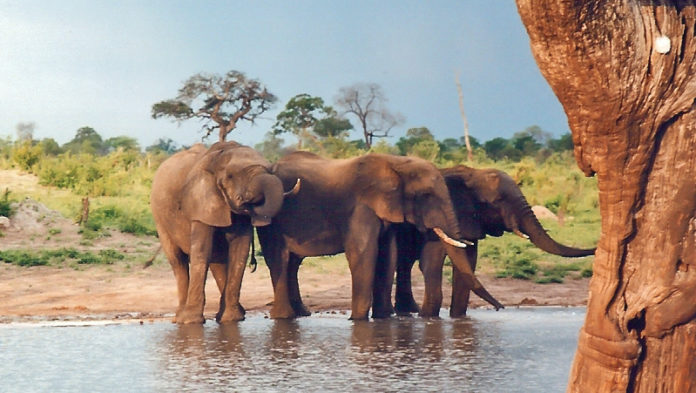
THE Zimbabwe government has awarded two coal mining concessions to Chinese companies inside the Hwange National Park which is the country’s flagship wildlife conservation area and home to one of the largest populations of elephant remaining in Africa.
The eastern boundary of the Hwange National Park sits adjacent Hwange Colliery – which is the country’s largest coal producer – and the coal deposit being exploited by the colliery extends west into the national park.
The allocation of the mining concessions was only discovered and made public when staff working for conservation non-government organisation (NGO), the Bhejane Trust – which monitors and protects black rhino in the national park -, found a group of Chinese inside the park.
They were arrested and handed over to the police, but they then returned with a permit giving them the right to carry on with exploratory drilling in the national park.
According to information posted on the Bhejane Trust website a follow-up investigation revealed that the mining concessions had been awarded to two Chinese companies as “special grants” which “apparently can only be awarded by the President”.
The coal mining concessions are SG7263 which has been granted to a company called Afrochine Energy which is part of the Tsingshan group and SG5756 which has been granted to the Zimbabwe Zhongxin Coal Mining group.
Tsingshan is the second largest manufacturer of stainless steel products in China. According to its profile on Linked-in, Afrochine Smelting has built a ferrochrome smelting plant at Selous which is 80kms west of the Zimbabwean capital Harare.
According to an article published on July 1 this year in the Bulawayo Chronicle – a daily paper serving Zimbabwe’s second largest city – the Zimbabwe Zhongxin Coking Company is building a coal-fired power station near Hwange which will produce 300MW of power when completed.
The article quoted Zimbabwe Zhongxin assistant plant manager, Andreas Hlabangana, as saying the company was receiving inadequate coal supplies from the Hwange Colliery and had applied to the Zimbabwe government for a “coal special grant”.
According to the Bhejane Trust a consultancy called SustiGlobal has been tasked to carry out an EIA (environmental impact assessment) study and has sent out questionnaires to “stakeholders” covering initial exploratory drilling and the opening of roads and building of camps, but the NGO pointed out that Zimbabwe Zhongxin has already started the exploratory work.
Any mining development inside the park will be a severe blow to Zimbabwe’s tourism industry and, in particular, the ecotourist companies which have been granted wildlife concessions in Hwange National Park where they have built lodges to attract foreign tourists.
Mark Butcher, CEO of Imvelo Safari Lodges which owns four lodges inside Hwange National Park, commented: “As an owner/operator and with over 40 years in Hwange since I first started as a cadet ranger, I am appalled and disgusted.
“I am convinced that we all need to build international pressure aimed at the Chinese and the Chinese companies involved.”
According to a statement from the Safari Operators Association of Zimbabwe “… following various representations and concerns from stakeholders we can now confirm that this issue has been escalated to the relevant government ministers”.
Because of the collapsed state of the Zimbabwe economy and lack of government funding the ecotourism companies have for years paid from their own pockets for essential services inside the national park such as anti-poaching operations and the maintenance of boreholes providing water for the wild animals.











